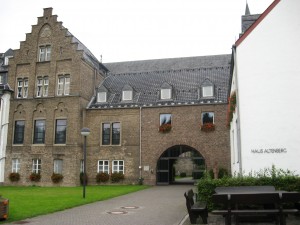
The above picture is of the “hostel” the PAD (Pädagogischer Austauschdienst, a department part of the German federal government that has promoted teaching assistantships for over 100 years starting with teacher assistants from the UK in Germany) chose to host our orientation in. I have friends who’ve done Fulbright Germany last year and the year before, and both have also had the lovely opportunity to stay in this beautiful place. The small town is called Altenberg, except that we didn’t stay in the town. We stayed in the former monastery directly connected to the cathedral/church there. Before I delve into orientation, click here for the PAD website if you’re curious about the department.

Here were the things that were bothersome about orientation, which I’ll just shortly get them out of my system now: superficially meeting so many people in one setting in such little time, the Q&A session was completely WACK (or in standard, correct English: useless, waste of my precious time, etc.) and the cathedral personnel rang the church bells quite early in the morning EVERY.SINGLE.MORNING. The bells I can completely understand: there were many Americans who didn’t have alarm clocks of any type after arriving in Germany only a day or two prior to orientation. The meeting people thing I should really get over because that’s what networking is about albeit with professionals and not people slightly offending you by thinking you’re slightly crazy for wanting to spend the entire year in a small Dorf (read: village) in Bavaria because there’s nothing to do there and the accent is wonky. Maybe they didn’t say it like that but they implied it. Maybe I’m just bitter because I’m a raving and raging fan of Bavaria. Or maybe I simply think men look good in Lederhosen.
Maybe I should get an English grammar book. Or a style guide. Or both?
The third thing I listed, the Q&A session, was not PAD’s fault. There are apparently former teaching assistants who come to the orientation every year to help the new teaching assistants feel more secure and to answer their questions. Furthermore, these people applied for and are successfully receiving a second year experience/award through the PAD (they’re not longer going through Fulbright). I found a couple of them quite arrogant and very condescending during the Q&A session. I even had lunch with two of them and successfully angered one of them by stating that I hated (I know, that’s a very harsh verb) the Berliner dialect. For those of you who like it: I’m sorry. But it is truly ugly. The almighty, second-year teaching assistant haughtily advised me not to tell the Berliners that I hate their dialect and accent. My reaction?
Um…what?
Even though I’m not as cunning, witty and intelligent as many people, I pride myself on having some tact.
But I digress!
The best parts of orientation were: meeting two people who were in Munich the same year as me but on the Wayne State University program, meeting lovely people who are in different parts of the country so I can visit them later, finding out that Mr. Reiner Rohr, one of the officials at the Fulbright Kommission, is the coolest, most humble, joke-y and helpful person and last but not least, planning a school lesson with three other people. My group and I taught a middle school-level class and the other teaching assistants loved it. I think they especially enjoyed my part, which was making all of them pronounce herbivore, omnivore, carnivore and slither. We taught the class about animals and wove in the use of yes/no questions 🙂
The weirdest part about Orientation? The American Fulbrighters were mixed with the British, New Zealand and Australian teaching assistants going solely through the PAD. I mean…they didn’t even think to have the Canadians join us too? It was fun to see/meet people who were not Americans but it was really confusing at times since the Americans needed specific information about Fulbright. The British contingency was also very confused about what Fulbright was. The British have a requirement to go abroad if they’re language majors and so many of them are counting this year as their year abroad by teaching English in the German school system, which is why the British were younger than the Americans (average age of Brits: 20, average age of Americans: 22/23).
I leave you all with a picture, promise and an article. The picture: there were cows right next to the monastery and cathedral. I think my excitement can be interpreted by the fact that I took pictures of them. The promise is an extra post this week since I didn’t have time to blog last week due to orientation. Last but not least: I found another article about German mentality in the NY times today. It’s about the new generation of Germans publicly embracing their pride in their identity.

